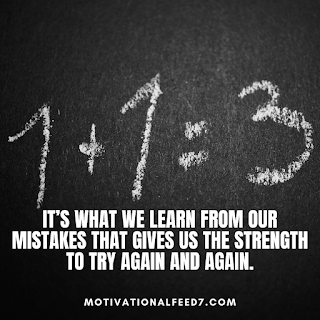 |
It’s what we learn from our mistakes that gives us the strength to try again and again.
Everyone makes mistakes.
Some people even make huge mistakes. This seems like an obvious statement to make, but what’s less obvious is that nobody understands why we mess up until after the fact.
Past mistakes can be difficult to confront and understand- in many cases, they take on much more impact than when you’d made them in real life- so it might be easier for you to just stay in the past rather than take responsibility for your actions.
This can be hard to overcome because we don’t want to think about what happened or give up chances at redemption, but we need to face the truth. If you’re not doing anything to make amends, you’re not going to change what happened; it’s only through taking ownership of your mistakes and learning from them that you’ll become a better person.
When you mess up, take responsibility for it. That’s the only way to start building something new. If you want to create change in your life, you need to admit that things aren’t perfect (because if they were, you wouldn’t need to make changes). The more openly you can talk about how things are, the less effort it will take for things to improve.
This doesn’t mean that mistakes turn into successes overnight- they don’t. You may need to stay dedicated to whatever you’re trying to improve for a while before you see the results. But the more your effort is focused on a specific type of change, the more likely you’ll see those changes from those efforts.
The only way to make those changes permanent is by learning from mistakes and continuing forward. That can take time, but this isn’t something that can be rushed: it takes time because we will never learn until we face our mistakes and continue forward.
When you look back at your mistakes, the only way to learn from them is to use those mistakes as motivation for change. The more we keep our eyes on the future and the constant improvement we want to make, the less we’ll linger in the past and cling to our failures.
That’s how we can better ourselves and become better people: by taking responsibility for our choices and learning from them.
It’s what we learn from our mistakes that gives us the strength to try again and again.
The following is a collection of wisdom from ancient texts, not just limited to Zen literature, compiled by the ancient Chinese philosopher Zhuangzi (also spelled Chuang Tzu).
1. “A good traveler has no fixed plans and is not intent upon arriving. A good artist lets his intuition lead him wherever he wants. A good scientist has freed himself of concepts and keeps his mind open to what is. Thus the master is available to all people and doesn't reject anyone. He is ready to use all situations and does not waste anything. This is called embodying the light."
- Zhuangzi, “The Way Of Chuang Tzu”
2. "If you do not know the man, it is difficult to have a conversation with him. If you do not know the situation, it is difficult to have a good argument with him. If you do not know the time, it is impossible to persuade him."
- Zhuangzi, “The Way Of Chuang Tzu”
3. "In each case when there is no way out, I look for a way through. If there is no way out, I make one. If there is no way through, I go around it."
- Zhuangzi, “The Way Of Chuang Tzu”
4. "When the Tao flows, the ten thousand things take shape; When the ten thousand things take shape, the Tao abides."
- Zhuangzi, “The Way Of Chuang Tzu”
5. Practicing not-doing brings achievement.
All sorts of things are done by not doing them,
yet nothing is left undone."
- Zhuangzi, “The Way Of Chuang Tzu”
6. The sage has no particular name. He gives names to things but only names them after he has let them be.""
- Zhuangzi, “The Way Of Chuang Tzu”
7. The Perfect Man is not virtuous; the virtuous man is not perfect. The Perfect Man uses his virtue sparingly; the virtuous man uses his virtue for everything. The Perfect Man has no outstanding characteristics; the virtuous man has nothing that he can boast about. The Perfect Man acts without any expectations; the virtuous man sets store by the results of what he does.""
- Zhuangzi, “The Way Of Chuang Tzu”
8. To go from being a person to being a sage, you have to discard all your claims to be a person."
- Zhuangzi, “The Way Of Chuang Tzu”
9. I have no preferences. I keep myself open and easy and stand ready for whatever happens.""
- Zhuangzi, “The Way Of Chuang Tzu”